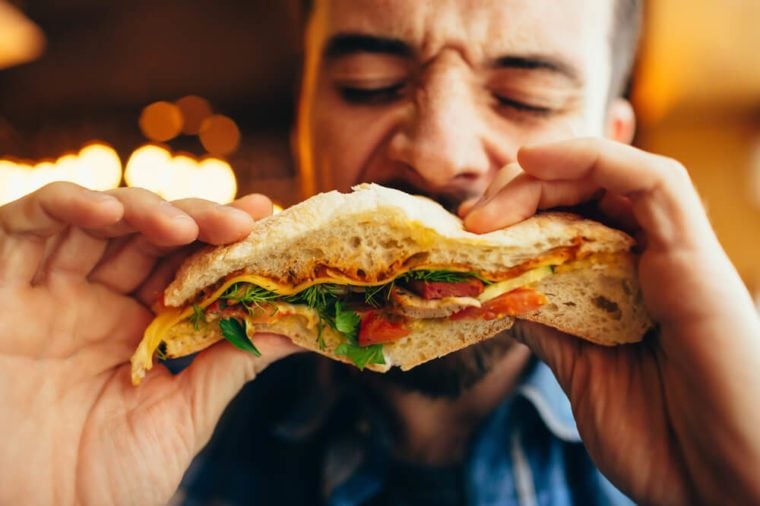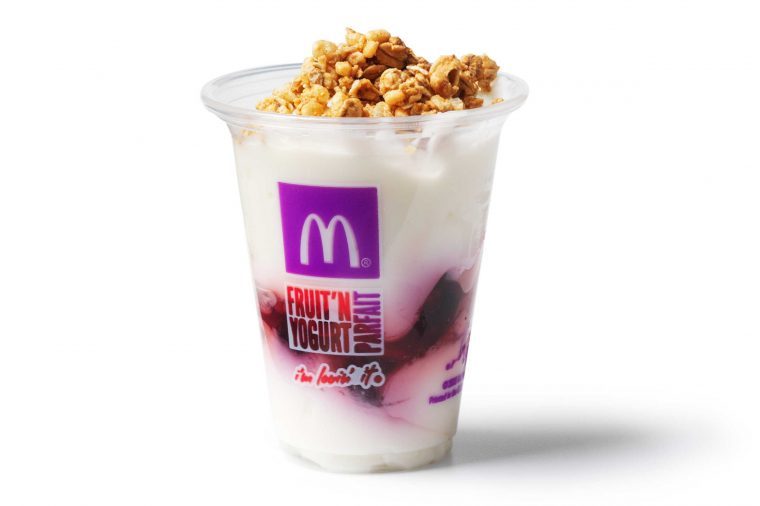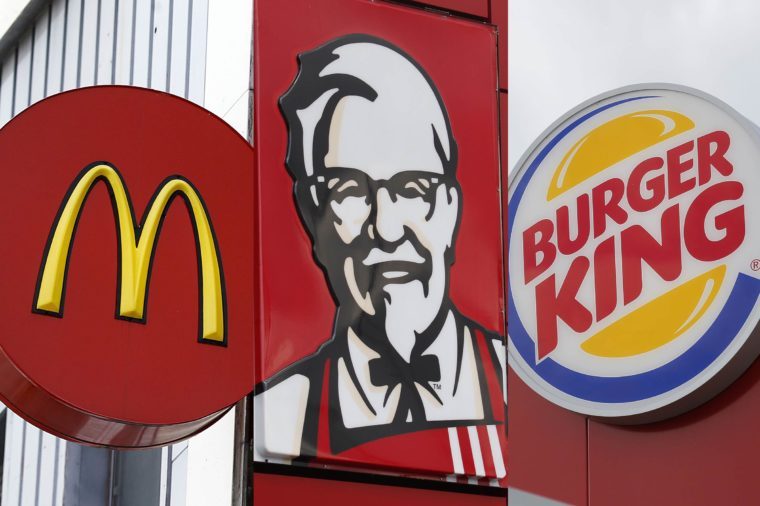![[feature]](https://blogger.googleusercontent.com/img/b/R29vZ2xl/AVvXsEgElEkZ3bYhoBHgEFatqT6fLBLWW8hmrpebS1GiiTJsmQEqJoH5NumsmqGAeoxROVokXPXwVVzIooLg3Q9G8lQhevywlgcvdqfIcvB6MGCG31JRlgfWM-A70ydt3-lfsyl2yziwtJY3SO8/s1600-rw/This-is-What-Fast-Food-is-Really-Doing-to-Your-Immune-System-760x506.jpg)
You probably know it can blow up your waistline, but fast food may also have a surprising impact on your mood and mind.
By Lauren Fisher, Reader's Digest
[post_ads_2]
You feel more impatient
 |
In a series of different experiments, Canadian
researchers found that merely thinking about fast food can prime people
to feel hurried. In another experiment, people who subconsciously viewed
fast food logos and then read certain passages rushed through them more
quickly than people who weren't exposed to the logos. "The way people
eat has far-reaching—and often unconscious—influences on behavior and
choices unrelated to eating," the study authors noted. This is what fast food does to your immune system.
You splurge more
 |
Fast food may make us more likely to splurge,
even when we're no longer in the restaurant. "We associate fast food
with speed and instant gratification," says Sanford DeVoe, an associate
professor at the University of Toronto's Rotman School of Management,
whose research found that households in neighborhoods with more fast
food restaurants have lower levels of savings (even after accounting for
variables like income, education, or ethnicity) than those with fewer
fast food outlets. "When we see fast food logos or recall a recent
experience eating at a fast food restaurant, we are put into a mental
state of impatience that may make us more likely to spend on an
immediate reward than save for something down the road," says DeVoe.\
[post_ads_2]You may be prone to depression
 |
People who eat a lot of fast food are 51
percent more likely to be depressed than those who steer clear of it,
according to a Spanish study. The more burgers, pizza, and fries people
ate, the greater their risk. More research is needed to see whether a
fast food diet causes depression, or whether people with depression are
simply more likely to dine on fast food. "Higher intake of fast food may
very well increase risks of depression by causing poor health in
general," said David Katz, MD, director of Yale University's Prevention
Research Center in New Haven, Connecticut, told ABC News. "But depression may also increase fast food intake. We use the words 'comfort food' for a reason." Learn what foods are the absolute worst for your brain.
You eat too fast, and too much
 |
It's not the food that makes you eat quickly,
research shows; it's the overall atmosphere when you eat out. Fast food
restaurants are designed with speed eating in mind—and studies show the
quicker you eat, the more calories you consume. Bright colors, like
yellow and red, are mentally stimulating. Harsh lighting and loud music
can also make you race through your meal. In fact, when Cornell
researchers gave a Hardee's restaurant a fine-dining makeover with
additions like soft lighting and jazz ballads, people ate almost 200
fewer calories and said they enjoyed their meals more than those who ate
in the usual setting. Here's the truth about what eating too fast does to your body.
[post_ads_2]
Your brain gets hooked on sugar
 |
People think fast food is high in calories and
fat, but many of us also don't realize how high in sugar certain fast
food meals can be. In fact, it's often the foods that sound "healthy"
that pack the most sweet stuff. For example, a Wendy's Apple Pecan
Chicken Salad contains 40 grams of sugar; a McDonald's Fruit &
Yogurt Parfait has 22 grams. (Public health organizations recommend
consuming no more than 24 grams of added sugar per day.) Recent
research has indicated high sugar intake can lead to myriad health
issues from heart disease to diabetes to obesity. Brain scans also
reveal how sugar can be addictive: the more you eat, the more you're
likely to keep craving it. Learn which foods actually boost your brain health.
You may be more vulnerable to media messages
 |
According to a report by the Yale Rudd Center
for Food Policy & Obesity, fast food brands spent $4.6 billion on
advertising. Kids under age 6 viewed nearly three fast food ads daily on
average, and teens between 12 and 17 saw nearly five. According to
Jennifer L. Harris, PhD, director of marketing initiatives at Yale's
Rudd Center, in a PsychologyToday.com blog,
adolescent brains are particularly susceptible to food advertising
messages. Brain scans show that the reward centers of teen minds have a
greater response to food advertisements and food logos, including fast
food, compared with other types of ads, she wrote. What's more, she
continued, "due to heightened reward sensitivity, adolescents are not
biologically equipped to forgo these tempting offers in the short-term
for greater rewards in the future (such as good health)." See how your
favorite fast food chains scored in this Center for Food Safety health rating.
[post_ads_2]
You become more anxious
 |
You can become hyperactive
 |
[post_ads_2]
Your risk of dementia can increase
 |
Your learning capabilities may decrease
 |
[post_ads_2]
Your mood could go from bad to worse
 |
[post_ads_2]
You may have a harder time controlling your appetite
 |
Fast food is addictive, and that's no accident. The trans fats in
many fried foods can hinder your brain's ability to discern how much
you've eaten and how hungry you are. So you buy—and eat—more. Fast food
can even trigger the pleasure centers of the brain to release dopamine,
the same chemical that fuels addictions. In extreme cases, a serious
fast food addiction can develop. In a similar way to drug addiction, our
brains require more and more junk food to satisfy the craving. Even
after learning all this, though, giving up junk food is easier said than
done. However, there are plenty of ways to train your brain to stop craving the unhealthy stuff.
























